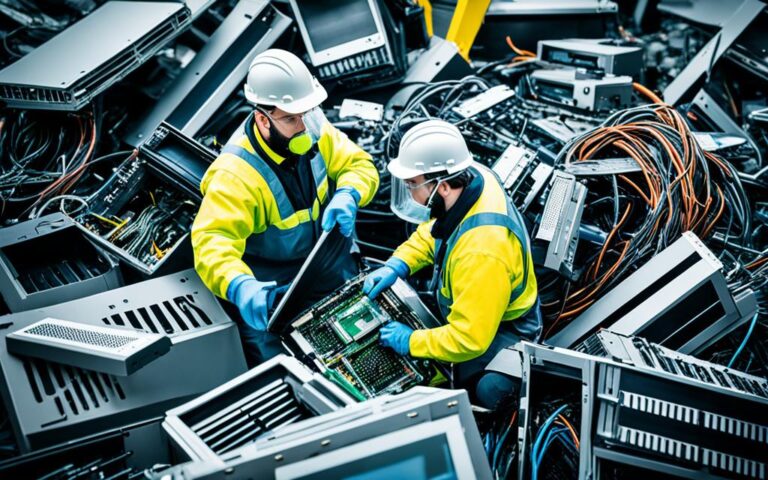How to Engage Employees in Your Company’s Server Recycling Efforts
Employee engagement in server recycling efforts is crucial for making server disposal eco-friendly and promoting sustainability in the workplace. By inspiring and motivating employees to actively participate in server recycling initiatives, companies can achieve a more sustainable and environmentally friendly approach to server disposal.
In this article, we will explore strategies and practices that can help engage employees in your company’s server recycling efforts. We will highlight the benefits of employee engagement in recycling, such as increased productivity, improved retention, and enhanced overall engagement.
Building a sustainable company culture begins with aligning personal and corporate values. By defining your company’s long-term purpose and integrating sustainability into the corporate culture, you can create a sense of purpose and shared responsibility among your employees.
Effective communication and education are also essential in engaging employees in a recycling program. By communicating your commitment to recycling and explaining the impact of recycling on the environment, you can raise awareness and encourage participation. Visuals, such as posters or progress charts, can serve as reminders and keep employees engaged in the program.
Incentivizing employee participation is another powerful approach to engage employees in server recycling efforts. By creating competitions, offering prizes or rewards, and providing sustainability-related employee benefits, you can motivate and reward employees for their active involvement.
In conclusion, by implementing a holistic approach that includes effective communication, employee incentives, and the right materials, your company can achieve success in server recycling and employee engagement. Together, let’s take small steps towards a more sustainable future and inspire others to follow suit.
Integrating Sustainability into Company Culture
Companies that successfully integrate sustainability into their corporate culture are more likely to achieve employee engagement in recycling initiatives. Creating a sustainable company culture requires aligning personal and corporate values and defining the company’s long-term purpose to inspire employees.
Visible support from top management is crucial in fostering a sustainable company culture. When leaders demonstrate their commitment to sustainability, employees are more likely to follow suit. Effective communication is also essential to keep employees informed about sustainability progress and initiatives.
Including sustainability goals in job descriptions and employee training programs helps embed sustainability into the fabric of the company. By integrating sustainability into various aspects of employees’ roles, companies create a work environment that encourages sustainability practices and behaviors.
The role of incentives and competition should not be underestimated in motivating employees to actively participate in sustainability initiatives. By offering rewards and recognition, companies can inspire friendly competition and create a sense of achievement among employees.
The Impact of Integrating Sustainability into Company Culture
“We believe that sustainability is not just an organization-wide initiative but also a personal responsibility. By integrating sustainability into our company culture, we empower our employees to make a positive impact on the environment while creating a fulfilling work experience.”
When sustainability becomes an integral part of a company’s culture, it transcends being a mere corporate initiative. It becomes a shared value and a driving force behind employee engagement.
Benefits of Integrating Sustainability into Company Culture
A sustainable company culture opens doors to various benefits:
- Enhanced employee morale and satisfaction
- Improved brand reputation
- Attracting and retaining top talent
- Reduced carbon footprint
Engaging employees in sustainability initiatives not only contributes to a greener future but also creates a positive work environment where employees feel motivated and fulfilled.
| Keys to Integrating Sustainability into Company Culture | Examples |
|---|---|
| Aligning personal and corporate values | AMV Solutions encourages employees to participate in environmental volunteering activities to align personal values with company values. |
| Defining a long-term purpose | GreenTech Services sets the ambitious goal of becoming a carbon-neutral company by 2030, inspiring employees to contribute towards achieving this purpose. |
| Visible support from top management | Clearwater Industries’ CEO actively participates in sustainability initiatives and shares progress with employees during town hall meetings. |
| Including sustainability goals in job descriptions and employee training programs | Sustainability is a core competency included in the performance evaluation criteria at EcoTech Systems. |
| Utilizing incentives and competition | EarthFirst Corp organizes an annual sustainability challenge where departments compete to reduce waste and improve recycling rates. |
Effective Communication and Education
Engaging employees in a recycling program requires effective communication and education. By clearly conveying the commitment to sustainability and explaining the impact of recycling on the environment, employees can be motivated to actively participate in the program. Visual aids, such as posters or progress charts, serve as powerful reminders and keep employees engaged in the recycling efforts.
The significance of climate trainings and educational programs cannot be understated. These initiatives increase employees’ awareness and understanding of sustainability and climate change, fostering a culture of environmental responsibility. One example of an effective educational program is the WorldClimate universal learning program, which is designed to educate staff about climate change and inspire positive climate action.
The WorldClimate Universal Learning Program
The WorldClimate universal learning program equips employees with the knowledge and skills to become advocates for sustainability. Through a combination of interactive modules, workshops, and real-world examples, participants gain a comprehensive understanding of climate change and its implications. The program empowers employees to take meaningful action to mitigate climate change, both individually and collectively.
Providing comprehensive sustainability communication and education fosters a sense of purpose and empowers employees to make a difference. By equipping them with the necessary knowledge and raising awareness, organizations can cultivate a workforce that actively participates in recycling initiatives and embraces sustainable practices.
| Benefits of Effective Communication and Education |
|---|
| Increased employee engagement in recycling programs |
| Enhanced understanding of sustainability and climate change |
| Empowerment to take individual and collective action |
| Alignment of values between employees and the company |
| Creation of a culture of environmental responsibility |
Incentivizing Employee Participation
Incentivizing employee participation is crucial to enhance employee engagement in recycling programs. By offering various incentives and rewards, you can motivate employees to actively contribute to sustainability efforts within your organization.
Creating Healthy Competition
One effective strategy is to foster competition between teams. By dividing employees into teams and setting recycling goals, you can encourage friendly rivalry and create a sense of excitement and achievement. Consider offering prizes or rewards to the team that meets or exceeds their recycling targets, such as team outings or bonuses.
Sustainability-Related Employee Benefits
In addition to competition, providing sustainability-related benefits can significantly boost employee engagement. Consider implementing initiatives like reimbursing employees for public transportation expenses or offering incentives for using electric vehicles. These benefits not only demonstrate your commitment to sustainability but also encourage employees to make eco-friendly choices.
Volunteer Opportunities and Service Projects
Engaging employees in volunteer opportunities related to environmental causes can be a powerful incentive. Organizing service projects focused on sustainability issues allows employees to contribute to the community while making a positive impact on the environment. Consider partnering with local environmental organizations or hosting company-wide volunteering events to provide meaningful volunteer opportunities.
Employee Resource Groups
Employee resource groups focused on sustainability can play a crucial role in fostering employee engagement. These groups provide a platform for employees to share ideas, collaborate on sustainability initiatives, and drive positive change within the organization. Encouraging employees to join these groups and actively participate can enhance their commitment to sustainability.
Challenges and Recognition
Recognizing employees for their personal sustainability practices and achievements is essential for maintaining engagement. Consider implementing challenges related to personal sustainability goals, such as reducing carbon footprints or adopting greener habits. Celebrate the accomplishments of individuals who actively contribute to sustainability initiatives to inspire others to follow suit.
“Incentivizing employees to participate in sustainability efforts not only benefits the environment but also creates a more engaged workforce. By offering rewards, providing volunteer opportunities, and recognizing individual efforts, organizations can foster a culture of sustainability and make a significant positive impact.” – Jane Mitchell, Sustainability Manager at GreenTech Ltd.
| Incentive | Description |
|---|---|
| Team Competition | Create friendly competition between teams, rewarding the team that meets or exceeds recycling goals. |
| Sustainability-Related Benefits | Offer incentives such as reimbursement for public transportation or incentives for using electric vehicles. |
| Volunteer Opportunities | Organize service projects and provide employees with meaningful opportunities to volunteer for environmental causes. |
| Employee Resource Groups | Encourage employees to join sustainability-focused groups to collaborate and drive positive change within the organization. |
| Challenges and Recognition | Implement challenges related to personal sustainability goals and recognize employees for their efforts and achievements. |
Conclusion
Implementing a successful recycling program requires a holistic approach that includes effective communication, employee incentives, and the right materials. By engaging employees in recycling initiatives, companies can achieve not only environmental benefits but also improved employee engagement and overall sustainability in the workplace.
A sustainable company culture plays a crucial role in driving recycling program success. By aligning personal and corporate values, organizations can inspire employees to actively participate in recycling initiatives and adopt sustainable habits both at work and in their personal lives.
Clear communication is key in ensuring employee understanding and commitment to the recycling program. By using visuals, such as posters and progress charts, companies can remind employees about the program and keep them engaged. Additionally, providing climate trainings and education programs can increase awareness and knowledge about sustainability and climate change.
Offering incentives and volunteer opportunities further incentivizes employee participation and fosters a sense of ownership and accountability. By recognizing and rewarding employees for their recycling efforts, companies can create a positive and competitive environment that drives engagement and meets recycling goals. Moreover, encouraging volunteer activities related to environmental issues strengthens employees’ connection to sustainability and their desire to make a positive impact.
Creating a successful recycling program requires commitment, collaboration, and continuous improvement. By integrating sustainable habits into the company culture, providing the right materials and resources, and valuing employee contributions, organizations can drive recycling program success, engage employees, and foster a more sustainable future.
FAQ
Why is employee engagement important in server recycling efforts?
Employee engagement is crucial for making server disposal eco-friendly and promoting sustainability in the workplace. Engaged employees actively participate in recycling initiatives, which leads to increased productivity, improved retention, and enhanced overall engagement.
How can companies integrate sustainability into their corporate culture?
Companies can integrate sustainability into their corporate culture by aligning personal and corporate values, defining the company’s long-term purpose, and integrating sustainability goals into job descriptions and employee training programs. Visible support from top management, effective communication of sustainability progress, and the use of incentives and competition can also motivate employees to actively participate in sustainability initiatives.
How can effective communication and education contribute to employee engagement in recycling programs?
Effective communication plays a vital role in engaging employees in recycling programs. It is important to communicate the commitment to recycling and explain the impact of recycling on the environment. Visuals, such as posters or progress charts, can remind employees about the program and keep them engaged. Climate trainings and educational programs that increase awareness and understanding of sustainability and climate change, such as the WorldClimate universal learning program, can also contribute to employee engagement.
How can employee participation be incentivized in a recycling program?
Employee participation in a recycling program can be incentivized through creating competition between teams, offering prizes or rewards for meeting recycling goals, and providing sustainability-related employee benefits, such as reimbursement for public transportation or electric vehicle incentives. Volunteer opportunities and service projects focused on environmental issues can also motivate employees to actively participate. Employee resource groups and challenges related to personal sustainability practices are additional ways to foster employee engagement.
What is the key to implementing a successful recycling program?
Implementing a successful recycling program requires a holistic approach that includes effective communication, employee incentives, and the provision of the right materials. Clear communication of the program’s purpose and progress, the use of incentives and competition, and providing the necessary materials are crucial for the success of a recycling program and the achievement of sustainability goals. Engaging employees in recycling initiatives can have a positive impact and organizations are encouraged to take small steps towards creating a sustainable company culture and promoting more sustainable habits.













